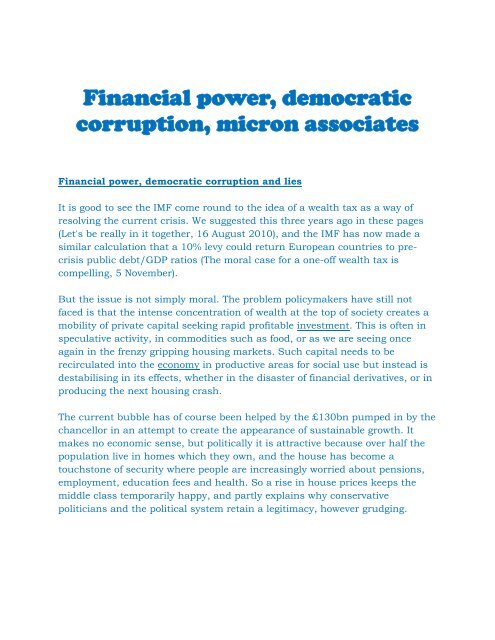Financial power, democratic corruption, micron associates
Financial power, democratic corruption and lies It is good to see the IMF come round to the idea of a wealth tax as a way of resolving the current crisis. We suggested this three years ago in these pages (Let's be really in it together, 16 August 2010), and the IMF has now made a similar calculation that a 10% levy could return European countries to pre-crisis public debt/GDP ratios (The moral case for a one-off wealth tax is compelling, 5 November).
Financial power, democratic corruption and lies
It is good to see the IMF come round to the idea of a wealth tax as a way of resolving the current crisis. We suggested this three years ago in these pages (Let's be really in it together, 16 August 2010), and the IMF has now made a similar calculation that a 10% levy could return European countries to pre-crisis public debt/GDP ratios (The moral case for a one-off wealth tax is compelling, 5 November).
Create successful ePaper yourself
Turn your PDF publications into a flip-book with our unique Google optimized e-Paper software.
<strong>Financial</strong> <strong>power</strong>, <strong>democratic</strong><br />
<strong>corruption</strong>, <strong>micron</strong> <strong>associates</strong><br />
<strong>Financial</strong> <strong>power</strong>, <strong>democratic</strong> <strong>corruption</strong> and lies<br />
It is good to see the IMF come round to the idea of a wealth tax as a way of<br />
resolving the current crisis. We suggested this three years ago in these pages<br />
(Let's be really in it together, 16 August 2010), and the IMF has now made a<br />
similar calculation that a 10% levy could return European countries to precrisis<br />
public debt/GDP ratios (The moral case for a one-off wealth tax is<br />
compelling, 5 November).<br />
But the issue is not simply moral. The problem policymakers have still not<br />
faced is that the intense concentration of wealth at the top of society creates a<br />
mobility of private capital seeking rapid profitable investment. This is often in<br />
speculative activity, in commodities such as food, or as we are seeing once<br />
again in the frenzy gripping housing markets. Such capital needs to be<br />
recirculated into the economy in productive areas for social use but instead is<br />
destabilising in its effects, whether in the disaster of financial derivatives, or in<br />
producing the next housing crash.<br />
The current bubble has of course been helped by the £130bn pumped in by the<br />
chancellor in an attempt to create the appearance of sustainable growth. It<br />
makes no economic sense, but politically it is attractive because over half the<br />
population live in homes which they own, and the house has become a<br />
touchstone of security where people are increasingly worried about pensions,<br />
employment, education fees and health. So a rise in house prices keeps the<br />
middle class temporarily happy, and partly explains why conservative<br />
politicians and the political system retain a legitimacy, however grudging.


